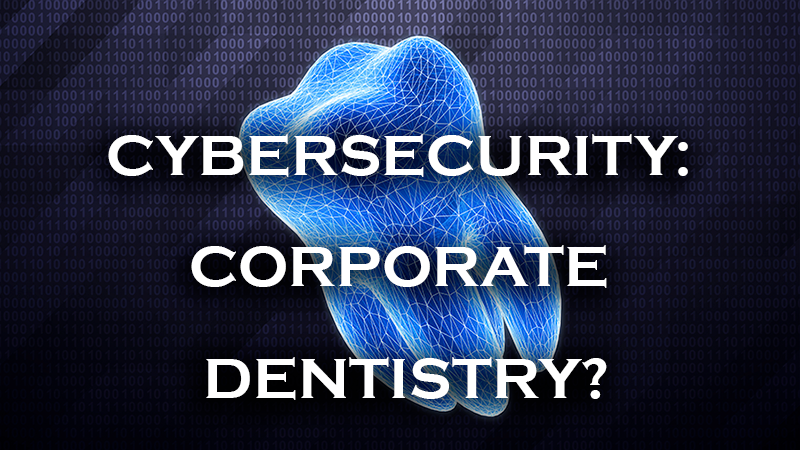Cybersecurity: The Corporate Dental Visit (and Ignored Just as Much)
Picture this: You’re sitting in the dentist’s chair, mouth agape, as the dental hygienist meticulously scrubs away plaque and tartar, while the dentist peers into the depths of your oral cavity, searching for any signs of trouble. It’s a routine you faithfully follow, knowing that neglecting your dental health can lead to painful cavities or dreaded root canals. But have you ever considered the striking resemblance between this experience and the realm of cybersecurity? Yes, you heard it right! Cybersecurity is like the corporate version of a dental visit – I’ll admit, it’s an odd comparison but bear with me.
Amidst discussions about profits, market strategies, and expansion plans, cybersecurity is often forgotten. Like an unnoticed cavity silently eroding dental health, cybersecurity is often disregarded or pushed aside by CEOs and corporate boards. Perhaps it’s the complex jargon or the misconception that cybersecurity is merely “an IT department’s concern”. (Boards Are Having the Wrong Conversations About Cybersecurity, Harvard Business Review) Regardless, this lack of attention leaves businesses vulnerable to an array of threats, just as neglecting dental health can lead to excruciating toothaches except in this case the toothache could lead to a life-threatening issue for the organization.

Still struggling with the corporate dental visit analogy? Let me draw some more parallels:
Preventive Care: Just as you visit the dentist regularly to prevent dental problems, cybersecurity also emphasizes preventive measures. In cybersecurity, implementing strong security measures, such as firewalls, antivirus software, and regular system updates, helps to prevent potential threats and vulnerabilities.
Regular Check-ups: Dentists recommend routine check-ups to identify any dental issues early on. Similarly, cybersecurity professionals conduct regular audits and assessments to identify vulnerabilities in systems and networks. By detecting weaknesses in advance, they can address them promptly and prevent potential breaches or cyberattacks.
Education and Awareness: Dentists educate patients about proper oral hygiene practices and the importance of regular brushing, flossing, and dental visits. Likewise, cybersecurity professionals promote education and awareness about safe online practices, such as creating strong passwords, recognizing phishing attempts, and being cautious while sharing personal information online.
Patching and Maintenance: Dental procedures often involve fixing cavities or performing dental cleanings. Similarly, in cybersecurity, regular maintenance tasks include patching software vulnerabilities, updating security protocols, and ensuring systems are protected against emerging threats. These actions help to maintain a strong cybersecurity posture.
Many former executives were leaders before the current cybersecurity environment, and may not bring expertise, or even an approach for gaining that expertise, to their boards
Lucia Milică & Dr. Keri Pearlson, Harvard Business Review
Reactive Measures: In some cases, despite preventive efforts, dental problems may arise, such as tooth decay or gum disease. Similarly, in cybersecurity, despite taking precautions, breaches or attacks can still occur. Both dentists and cybersecurity professionals must respond promptly to address these issues and mitigate the damage caused.
Specialist Expertise: Dentistry and cybersecurity both require specialized knowledge and expertise. Dentists undergo years of education and training to understand oral health, perform procedures, and provide expert advice. Similarly, cybersecurity professionals acquire in-depth knowledge of information security, emerging threats, and defense mechanisms to safeguard systems and data.
Continuous Improvement: Dentistry and cybersecurity are constantly evolving fields. New techniques, technologies, and threats emerge regularly, requiring professionals to stay updated with the latest developments. Dentists attend conferences and workshops, while cybersecurity experts engage in ongoing training and certifications to enhance their skills and adapt to the evolving threat landscape.
Long-term Health: Regular dental care is essential for maintaining long-term oral health. Likewise, a robust cybersecurity strategy is crucial for the long-term well-being of organizations, ensuring the confidentiality, integrity, and availability of sensitive data and systems.
While cybersecurity and going to the dentist may seem different on the surface, they share similarities in terms of preventive care, regular check-ups, education, maintenance, reactive measures, specialist expertise, continuous improvement, and the focus on long-term health. Both emphasize the importance of proactive measures to prevent problems and the need for expert care to address any issues that arise.
Paul Bergman runs a business strategy and cybersecurity consulting company in San Diego. He writes on cybersecurity and board management for both corporate and nonprofit boards.
- The Imperative for Cyber Talent on Corporate Boards - March 29, 2024
- Talking CMMC preparation - March 12, 2024
- Protecting Your Business: Strategies to Combat DNS Attacks - February 20, 2024
